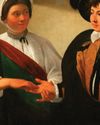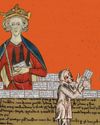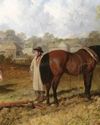
Rebecca Franks: How different was the Victorian view of death to our modern conception of it?
Judith Flanders: The main difference was that death was part of daily life. It wasn't neatly tucked away in hospitals where you could go in and visit someone for an hour but didn't see anyone die. Today, many people now go happily through their whole lives without ever seeing a dead person, which was simply not possible in the 19th century. Hospitals were very limited in the kinds of diseases and illnesses they cared for, and they were a place of last resort for people who were too poor or desperate to be cared for at home. Infant death was vastly more common than it is today, though that was also simply due to the vagaries of population. There were more young people than there were old people, and infant death therefore accounted for a much larger percentage of death than death in old age.
How did the level of infant mortality impact society?
For many years there was a theory among historians that because children died so frequently and so young, their parents didn't care about them - it wasn't worth investing emotion into small lives that might soon be lost. However, if you read the scraps of evidence we have regarding the working classes and their responses to children's deaths, this simply isn't true. For instance, we see parents naming their newborns after older siblings who had died. This was previously interpreted as proof of not caring, but it seems to me so obvious that for the most impoverished in society - particularly in the early part of the 19th century, when permanent gravestones were not common - this was the only way that they could memorialise their lost children. Because people do love their babies. We don't have to be terribly smart to know that.
Diese Geschichte stammt aus der March 2024-Ausgabe von BBC History UK.
Starten Sie Ihre 7-tägige kostenlose Testversion von Magzter GOLD, um auf Tausende kuratierte Premium-Storys sowie über 8.000 Zeitschriften und Zeitungen zuzugreifen.
Bereits Abonnent ? Anmelden
Diese Geschichte stammt aus der March 2024-Ausgabe von BBC History UK.
Starten Sie Ihre 7-tägige kostenlose Testversion von Magzter GOLD, um auf Tausende kuratierte Premium-Storys sowie über 8.000 Zeitschriften und Zeitungen zuzugreifen.
Bereits Abonnent? Anmelden

Viking mussels
ELEANOR BARNETT digs into archaeological research to recreate a Viking-cum-AngloSaxon seafood dish from medieval York

Fingers, frog's and fairies
Fortune telling was all the rage in the 16th and 17th centuries, and practitioners would stop at nothing to tap in to the supernatural. Martha McGill tells a story of Highland seers, tarot cards and encounters with the spirit world

Nothing matches being with Alexander the Great on foot in the Hindu Kush
AT OUR LITTLE FILM COMPANY, MAYA VISION, we recently took the decision to digitise all of the rushes of our key films so that we could dispose of hundreds of boxes of tapes that had been kept in storage, throwing out stuff we thought we would never need again.

Library of the dead
Highgate Cemetery, created as a fashionable resting place for wealthy Victorian dead, is a veritable who's who of London's great and good. PETER ROSS roams the avenues of this most atmospheric necropolis

Slavery, exploitation and racism. These tragedies have long dominated histories of Africa. But there's another way to tell this story. And it's one that puts Africans right at the centre of their continent's extraordinarily rich and vibrant past
An 1414, in the Chinese city of Nanjing, a giraffe caused a stir. Amid a crowd of shocked, noble spectators, an official, leading the creature via a rope tied round its face, presented it to China's Yongle emperor. His officials said it was a qilin - an auspicious unicorn - which his sage governance had made appear.

England's forgotten hero
When the Hundred Years' War was reaching a climax, one man was fighting tenaciously to secure the English claim to the French crown. So why, asks Joanna Arman, is Henry V's formidable brother, John, Duke of Bedford, not better known?

HENRY III AND THE MAGNA CARTA THAT MATTERED
King John's sealing of a charter at Runnymede in 1215 is one of the most feted moments of the Middle Ages. Yet, writes David Carpenter, it was the charter issued by his son 10 years later that became fundamental to England's history

Gutenberg publishes a pioneering new book
‘The printing press triggers an information revolution

How empire ruptured rural Britain
We know that enslaved Africans and their descendants suffered in the distant colonies of empire. But, as Corinne Fowler explains, the colonial system also had dire impacts on people in the countryside of the 'motherland'

"I FELT VERY ALONE IN A WORLD GONE HORRIBLY MAD"
It was a moment of possibilities, dislocation and dread. Dan Todman tells the story of the 1.5 million urban Britons evacuated to the countryside at the start of the Second World War